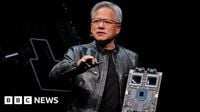In a move that’s sent shockwaves through the global tech industry and Washington alike, Nvidia and AMD have agreed to pay the U.S. government 15% of their revenue from selling artificial intelligence (AI) chips to China—a deal that’s as unprecedented as it is controversial. The arrangement, first reported on August 11, 2025, by the Financial Times and quickly confirmed by outlets like BBC and The Wall Street Journal, marks a new chapter in the ongoing saga of U.S.-China tech rivalry and the evolving role of government in high-stakes international commerce.
The roots of this agreement stretch back to April 2025, when President Donald Trump’s administration imposed a ban on Nvidia’s H20 and AMD’s MI308 chips, citing national security concerns. These chips, designed for AI applications, were deemed too powerful for export to China under existing controls. According to BBC, these restrictions followed earlier curbs introduced by the Biden administration in 2023, which had already blocked Nvidia’s A100 and H100 chips from reaching China’s shores. The H20, in particular, was developed specifically for the Chinese market after those earlier restrictions, using Nvidia’s Hopper architecture—a step down from its latest Blackwell series, but still a potent tool for AI inference and data processing.
But as the months dragged on, pressure mounted on both sides. Chinese tech firms, including giants like Alibaba and DeepSeek, were eager to get their hands on cutting-edge American chips, while U.S. chipmakers like Nvidia and AMD faced the prospect of losing access to one of the world’s largest and fastest-growing markets. Nvidia CEO Jensen Huang, not one to sit on the sidelines, launched a diplomatic blitz, lobbying officials in both Washington and Beijing. According to The Wall Street Journal, Huang met directly with President Trump on August 6, 2025, in a bid to break the deadlock.
The result? A deal that stunned industry watchers: in exchange for export licenses, Nvidia and AMD would pay 15% of their China-derived chip revenues to the U.S. government. The Commerce Department began issuing licenses for Nvidia’s H20 on August 8, with AMD’s MI308 following soon after. The agreement could funnel more than $2 billion into federal coffers, according to The New York Times, though the administration has yet to announce how it plans to use the windfall.
"We follow rules the U.S. government sets for our participation in worldwide markets," Nvidia said in a statement to BBC on August 11. The company added, "While we haven't shipped H20 to China for months, we hope export control rules will let America compete in China and worldwide." AMD, for its part, has remained tight-lipped, declining to comment directly on the deal.
The arrangement, however, has drawn fierce criticism from across the political spectrum, as well as from national security experts and trade policy analysts. Deborah Elms, head of trade policy at the Hinrich Foundation, told BBC, "You either have a national security problem or you don’t. If you have a 15% payment, it doesn’t somehow eliminate the national security issue." Peter Harrell, a former Biden administration official, echoed these concerns, writing, "Charging a fee in exchange for relaxing national security export controls is a terrible precedent… The U.S. Constitution flatly forbids export taxes." Democratic Congressman Jake Auchincloss was even more blunt, stating, "Now the U.S. government is financially motivated to sell AI to China? Makes me shudder to think what a TikTok deal might look like."
Security experts have also weighed in, warning that chips like the H20 and MI308 could bolster China’s AI ecosystem and military capabilities. In a letter to Commerce Secretary Howard Lutnick, a group of 20 specialists cautioned, "Chips optimized for AI inference will not simply power consumer products or factory logistics; they will enable autonomous weapons systems, intelligence surveillance platforms and rapid advances in battlefield decision-making." While Trump has publicly dismissed such concerns, calling the H20 chip "old" at a press conference on August 12, the debate over technological advantage and export controls is far from settled.
Indeed, the deal’s very structure is almost unheard of in U.S. trade policy. As The Wall Street Journal observed, it’s highly unusual—if not entirely new—for companies to essentially pay for export licenses. Geoff Gertz at the Center for New American Security told Reuters, "Either selling H20 chips to China is a national security risk, in which case we shouldn’t be doing it to begin with, or it’s not a national security risk, in which case, why are we putting this extra penalty on the sale?" The move has been likened by some investors to a "shakedown" or an illegal export tax, further complicating the legal and ethical landscape.
For Nvidia and AMD, the stakes are enormous. China represents a critical market, and the companies have argued that keeping U.S. chips in Chinese systems is preferable to ceding ground to domestic alternatives like Huawei’s Ascend processors. As Paul Triolo of DGA-Albright Stonebridge Group explained to CNBC, the U.S. strategy may be to "addict China to substandard, or non-cutting edge technology," thereby maintaining a competitive edge. Still, with Chinese firms rapidly developing their own AI chips—and stockpiling earlier generations of Nvidia hardware—the long-term effectiveness of such an approach is uncertain.
Meanwhile, the Trump administration has signaled it may be open to further deals. On August 12, President Trump suggested he’d consider allowing Nvidia to sell a downgraded version of its latest Blackwell AI chip to China, provided its performance is reduced by 30% to 50%. "It’s possible I’d make a deal on a somewhat enhanced—in a negative way—Blackwell processor," Trump said, adding that Nvidia CEO Huang was scheduled to meet him again soon. The Blackwell chip, described as "the latest and greatest in the world," remains blocked for export, but the prospect of a new arrangement has industry analysts watching closely.
As the dust settles, one thing is clear: the Nvidia and AMD revenue-sharing deal marks a turning point in U.S.-China tech relations and the global semiconductor market. It’s a gamble that could reshape the rules of international trade, with implications for national security, corporate strategy, and the future of AI innovation. Whether it proves a masterstroke or a cautionary tale remains to be seen—but for now, the world is watching, and the stakes couldn’t be higher.
With billions on the line and the balance of technological power at stake, the next moves by Washington, Beijing, and Silicon Valley will shape the future of AI—and perhaps the world itself.


